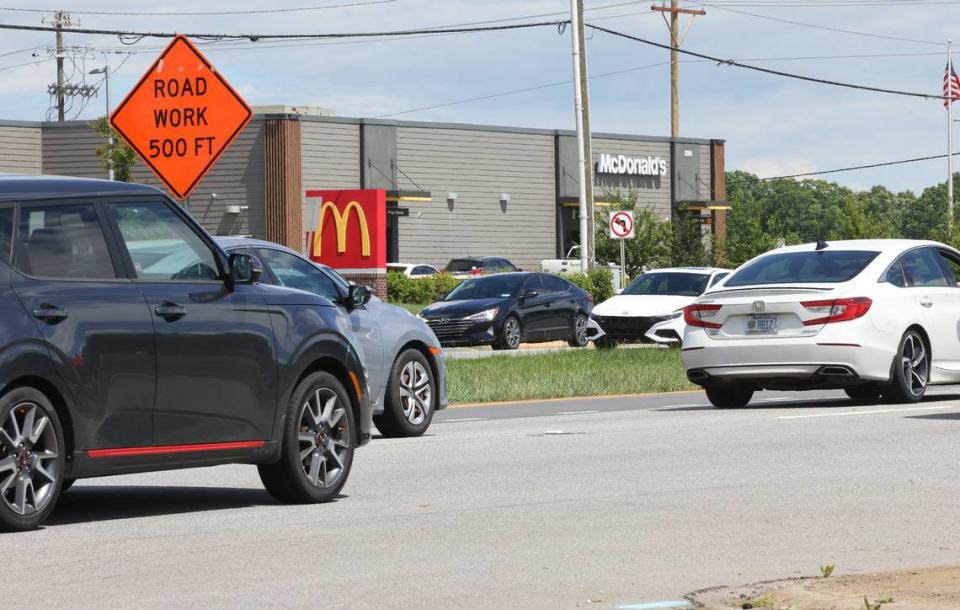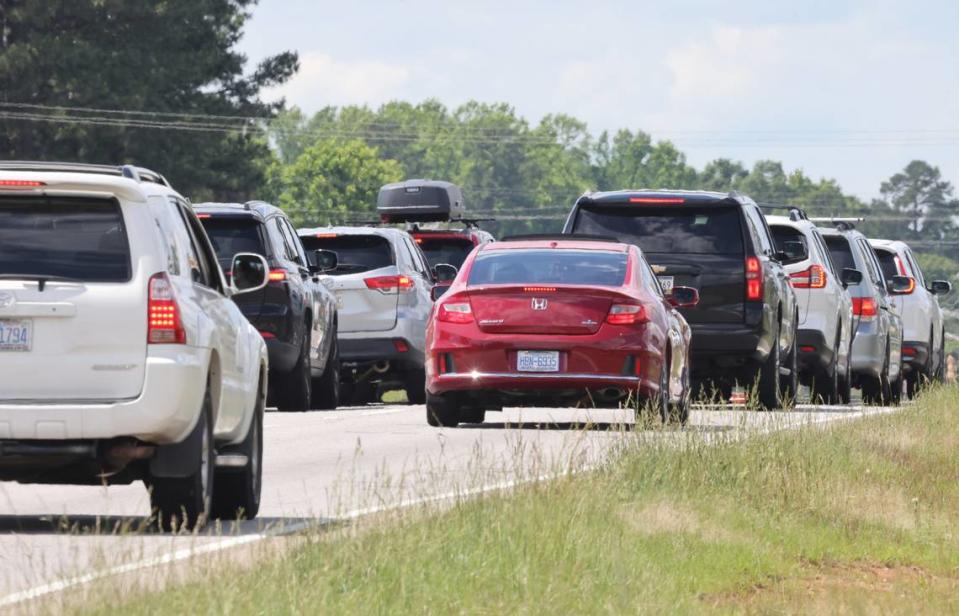Lancaster’s $400M dilemma: Fixing roads means a high sales tax. Voters will make the call
Lancaster County voters are likely to see a $400 million proposal to fix roads. It’s just a matter of when.
Lancaster County Council delayed a decision this week on a new transportation sales tax referendum. The new tax still could make it on the Nov. 5 general election ballot, or the county may push it to next year.
Council members have cost concerns with the plan that could push sales taxes to the highest rate in the state, but also see it as the only way to get major roadwork done without waiting — perhaps decades — on state funding.
“This would help us be in the driver seat as to what roads can get done,” said county administrator Dennis Marstall.
Here are details on the road plan, plus questions the county still needs to answer before voters get to decide whether to approve it:

What is the transportation tax?
The county began work about a year ago on a new, one-cent sales tax for roads.
It’s similar to the Pennies for Progress program York County started in 1997. Pennies comes to voters for a fifth time this fall, asking whether to extend the tax in York County for road construction and repair.
The Lancaster County tax likely would run 15 years, more than double the length of the one up for vote in York County. Lancaster County planners estimate the one-cent sales tax would generate about $400 million.
The county has about 1,400 miles of public roadway. Since 2018, about 94 miles have been improved through a separate county capital sales project tax, state gas tax funding and road fees.
The new tax would last for 15 years or until the $400 million listed on the ballot is collected, whichever comes first.
The $400 million is a conservative estimate. County figures show the tax likely would generate $419 million in that span, Marstall said.
“This also doesn’t take into account any new revenue drivers, or more retail, and different things within the county that may come online within the next 15 years,” he said. For instance, revenue from the planned Costco and Target stores coming to Indian Land aren’t included.
Lancaster County looks to fast-track plans for a sales tax hike to help fix roads
What roads would be fixed?
Recommended road spending includes:
▪ $100 million for resurfacing of roads identified by the county and its four municipalities
▪ $60 million for U.S. 521 widening or intersection work north of S.C. 75
▪ $30 million to widen Henry Harris Road to three lanes from U.S. 521 to Marvin Road
▪ $30 million for 11 intersection upgrades, many of them in Indian Land
▪ $30 million for miscellaneous needs like matching funds, inflation and project management
▪ $30 million to widen Harrisburg Road to three lanes from Calvin Hall Road to the North Carolina line
▪ $30 million to widen Barberville to three lanes from S.C. 160 to the North Carolina line
▪ $25 million to resurface 11 state roads
▪ $15 million for roundabouts at Henry Harris/Marvin roads, Steel Hill/Van Wyck roads, University/Hubbard drives, Shiloh Unity Road/Monroe Highway and Shiloh Unity/Camp Creek Road
▪ $15 million for traffic signals and road lighting
▪ $10 million to widen Riverside Road from S.C. 9 Bypass to University Drive
▪ $8 million for economic development (business parks, land for connector roads)
▪ $7 million for greenways and sidewalks
▪ $5 million for maintenance of Vance Baker, Calvin Hall and Reece/Lymon Reece roads, plus Sandra Lane
When is the road vote?
The two options for putting a transportation tax to voters are this fall, and next fall. The county voter registration office would need an approval from council by Aug. 1 to hold the referendum this fall.
There’s already a $588 million school bond on the ballot this year. Adding the transportation tax on top of that could overburden voters, said Councilman Allen Blackmon.
“If they want it, they’ll vote for it,” he said. “If they don’t they won’t. But I really do think we’re putting it out there at a bad time, and I think we’re dooming it to fail because of that timing.”
The concern with next year is, council still needs a legal opinion on whether the odd-year election qualifies as one they can use for the vote. Plus, road construction costs typically increase each year.
“Either we do it now or it’s not going to happen,” said Councilwoman Charlene McGriff. “You think next year will be better? There’s not going to be any changes. It’s still going to be an increase.”

How high will taxes be?
South Carolina has 46 counties. There’s a 6% base tax rate, and counties have options for adding more to fund public infrastructure, roads and other projects. Last year, three counties charged 6% and 15 of them (including York) taxed at 7%.
Lancaster was one of 17 counties that charged 8%. The county has a local option sales tax for general fund use and a capital project sales tax for large expenses. Each adds 1% to the statewide base amount.
Three counties — Berkeley, Charleston, Horry — charge 9%, the highest rate in the state. Lancaster County would join that list if voters add a new transportation tax.
That increase is significant, said Councilman Terry Graham. It’s enough for people who could drive to the Lowe’s in Indian Land or another one in Waxhaw, North Carolina, to change their plans, he said.
“I’ve already got constituents complaining about the sales tax in Lancaster County being higher,” Graham said.
Groceries already cost more than they have in the past, said Councilman Billy Mosteller, and residents would feel the increase.
“Everything you do is going to cost you more,” he said. “People don’t have a lot of money right now.”

What will the ballot question ask?
The proposed referendum shows two questions. One asks whether the county should be able to start the tax. A second question asks whether the county should be able to issue bonds for road work, to be paid back from the new tax.
Bonding would allow up-front money on large projects like U.S. 521, which could provide matching dollars to lure grants or other outside funding.
“The only way we’re going to be on anyone’s radar at the state (or for federal dollars) is to have some local money in the game,” Marstall said.
The ballot isn’t finalized and there are details in discussion, like whether to list some or all of the more than 125 road projects by name.
“I’m particularly concerned about (U.S.) 521, Henry Harris, Barberville and Harrisburg roads,” said Councilman Jose Luis. “And making sure that those funds are allocated and can only be used for those purposes.”
Several council members offered concerns about widening and improving so many roads without a clear plan in place to address rapid community growth. Issues like impact fees, developer contributions for roads and others need to be addressed, they said, or the improved roads could make problems worse.
“Council has not shown much foresight for growth,” Graham said. “It happened around Charlotte. Look what happened at 485. They built it and all the growth came around it because they didn’t slow down the growth.”
Still, poor or crowded road conditions are an issue that impacts all parts of the county, council members said. There are outside pressures, too, like plans in North Carolina to break ground in 2026 on a third southbound lane of U.S. 521 coming into Lancaster County, Marstall said.
“We’ve got a problem,” McGriff said. “And this is the only way that, locally, we’ll be able to control it.”


